人教版九年级英语2单元教案
- 格式:doc
- 大小:112.00 KB
- 文档页数:9
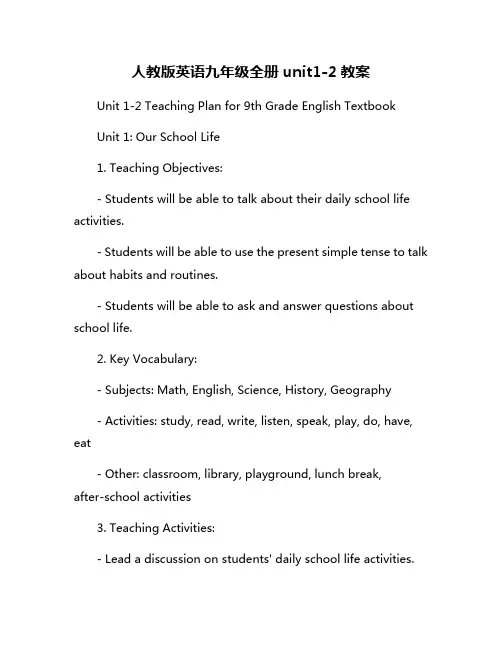
人教版英语九年级全册unit1-2教案Unit 1-2 Teaching Plan for 9th Grade English TextbookUnit 1: Our School Life1. Teaching Objectives:- Students will be able to talk about their daily school life activities.- Students will be able to use the present simple tense to talk about habits and routines.- Students will be able to ask and answer questions about school life.2. Key Vocabulary:- Subjects: Math, English, Science, History, Geography- Activities: study, read, write, listen, speak, play, do, have, eat- Other: classroom, library, playground, lunch break,after-school activities3. Teaching Activities:- Lead a discussion on students' daily school life activities.- Introduce vocabulary and practice pronunciation.- Discuss routines and habits using the present simple tense.- Role-play asking and answering questions about school life activities.- Present a short video or audio clip of a typical school day.- Have students create a daily schedule for themselves and share with the class.4. Assessment:- Quizzes on vocabulary and grammar usage.- Oral presentations of daily schedules.- Written assignments on describing school life activities.Unit 2: The World Around Us1. Teaching Objectives:- Students will be able to talk about different countries and cultures.- Students will be able to use adjectives to describe places and people.- Students will be able to use comparative and superlative forms.2. Key Vocabulary:- Countries: China, Japan, France, Brazil, Australia- Adjectives: beautiful, crowded, modern, traditional, diverse- Comparative and Superlative Forms: bigger, more crowded, most diverse3. Teaching Activities:- Introduce the countries and their cultures through pictures and videos.- Discuss the adjectives used to describe different places and people.- Practice using comparative and superlative forms in sentences.- Have students work in pairs to compare two countries of their choice.- Conduct a class debate on the best country to visit based on the criteria discussed.4. Assessment:- Quizzes on vocabulary and grammar structures.- Written assignments comparing two countries.- Oral presentations on a chosen country's culture and attractions.Overall, the teaching plan for Unit 1-2 of the 9th-grade English textbook focuses on developing students' language skills in talking about daily routines and school life activities, as well as describing different countries and cultures. Through a variety of vocabulary and grammar exercises, as well as interactive activities and discussions, students will be engaged and motivated to learn English in a fun and meaningful way.。
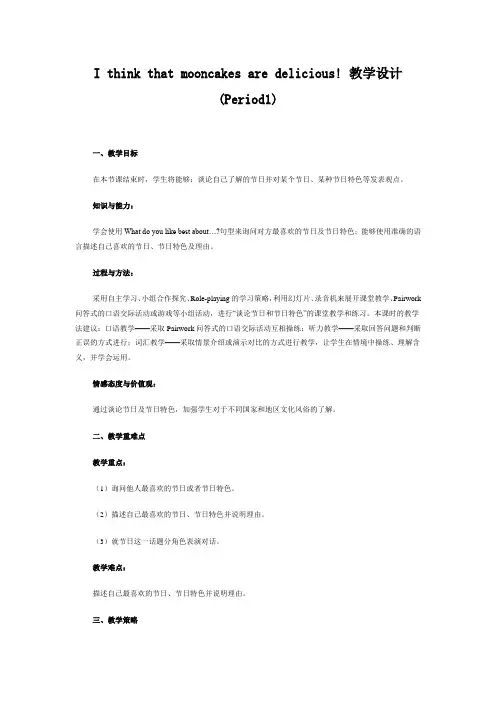
I think that mooncakes are delicious! 教学设计(Period1)一、教学目标在本节课结束时,学生将能够:谈论自己了解的节日并对某个节日、某种节日特色等发表观点。
知识与能力:学会使用What do you like best about…?句型来询问对方最喜欢的节日及节日特色;能够使用准确的语言描述自己喜欢的节日、节日特色及理由。
过程与方法:采用自主学习、小组合作探究、Role-playing的学习策略,利用幻灯片、录音机来展开课堂教学、Pairwork 问答式的口语交际活动或游戏等小组活动,进行“谈论节日和节日特色”的课堂教学和练习。
本课时的教学法建议:口语教学——采取Pairwork问答式的口语交际活动互相操练;听力教学——采取回答问题和判断正误的方式进行;词汇教学——采取情景介绍或演示对比的方式进行教学,让学生在情境中操练、理解含义,并学会运用。
情感态度与价值观:通过谈论节日及节日特色,加强学生对于不同国家和地区文化风俗的了解。
二、教学重难点教学重点:(1)询问他人最喜欢的节日或者节日特色。
(2)描述自己最喜欢的节日、节日特色并说明理由。
(3)就节日这一话题分角色表演对话。
教学难点:描述自己最喜欢的节日、节日特色并说明理由。
三、教学策略口语教学——采取Pairwork问答式的口语交际活动等小组互动活动互相操练;听力教学——采取回答问题和判断正误的方式进行;词汇教学——采取情景介绍或演示对比的方式进行教学,让学生在情境中操练、理解含义,并学会运用。
四、教学过程Step 1:Lead-in导入本单元话题——节日。
教师通过提问Do you know these festivals? , What other festivals do you know? 和What festivals do the pictures remind you of?让学生思考、了解、谈论部分中西方节日及节日特色。
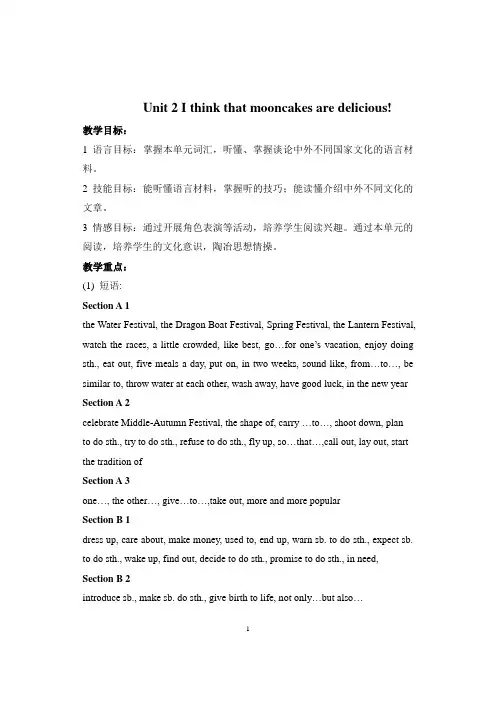
Unit 2 I think that mooncakes are delicious!教学目标:1语言目标:掌握本单元词汇,听懂、掌握谈论中外不同国家文化的语言材料。
2 技能目标:能听懂语言材料,掌握听的技巧;能读懂介绍中外不同文化的文章。
3 情感目标:通过开展角色表演等活动,培养学生阅读兴趣。
通过本单元的阅读,培养学生的文化意识,陶冶思想情操。
教学重点:(1) 短语:Section A 1the Water Festival, the Dragon Boat Festival, Spring Festival, the Lantern Festival, watch the races, a little crowded, like best, go…for one’s vacation, enjoy doing sth., eat out, five meals a day, put on, in two weeks, sound like, from…to…, be similar to, throw water at each other, wash away, have good luck, in the new year Section A 2celebrate Middle-Autumn Festival, the shape of, carry …to…, shoot down, planto do sth., try to do sth., refuse to do sth., fly up, so…that…,call out, lay out, start the tradition ofSection A 3one…, the other…, give…to…,take out, more and more popularSection B 1dress up, care about, make money, used to, end up, warn sb. to do sth., expect sb. to do sth., wake up, find out, decide to do sth., promise to do sth., in need, Section B 2introduce sb., make sb. do sth., give birth to life, not only…but also…1(2) 句子:Section A 1Bill thinks that the races were not that interesting to watch.Bill wonders whether they’ll have the sweet rice dumplings again next year. What do you like best about the Dragon Boat Festival?What did you do on your vacation?But I believe that April is the hottest month of the year there.I wonder if it’s similar to the water festival of Dai people in Yunnan Province. Section A 2Chinese people have been celebrating Middle-Autumn Festival and enjoying mooncakes for centuries.They carry people’s wishes to the families they love and miss.However, most people think that the story of Chang’e is the most touching. Whoever drank this could live forever.Hou Yi was so sad that he called out her name to the moon every night.How he wished that Chang’e could come back!Section A 3Do you know that there are two special days for parents in America?I believe that there are many ways to show our love.It is also a good idea to help parents to do something instead.Section B 1Many would agree that when we think of Christmas, we probably think of gifts, Christmas trees and Santa Claus.A Christmas Carol is a famous novel written by Charles Dickens.He just cares about whether he can make more money.Marley used to be just like Scrooge, so he was punished after he died.2He now treats everyone with kindness and warmth, spreading love and joy everywhere he goes.Section B 2Not only do people spread them around in different hiding places for an egg hunt, but they also give out these treats as gifts.教学难点:1. 学会运用宾语从句来表达句子。
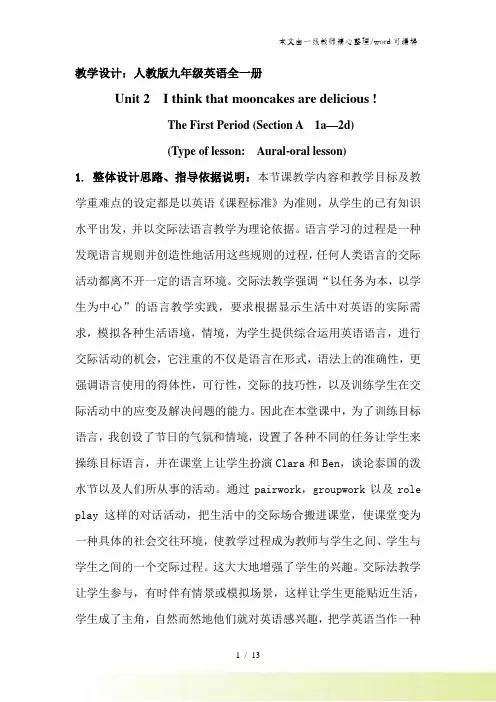
教学设计:人教版九年级英语全一册Unit 2 I think that mooncakes are delicious !The First Period (Section A 1a—2d)(Type of lesson: Aural-oral lesson)1. 整体设计思路、指导依据说明:本节课教学内容和教学目标及教学重难点的设定都是以英语《课程标准》为准则,从学生的已有知识水平出发,并以交际法语言教学为理论依据。
语言学习的过程是一种发现语言规则并创造性地活用这些规则的过程,任何人类语言的交际活动都离不开一定的语言环境。
交际法教学强调“以任务为本,以学生为中心”的语言教学实践,要求根据显示生活中对英语的实际需求,模拟各种生活语境,情境,为学生提供综合运用英语语言,进行交际活动的机会,它注重的不仅是语言在形式,语法上的准确性,更强调语言使用的得体性,可行性,交际的技巧性,以及训练学生在交际活动中的应变及解决问题的能力。
因此在本堂课中,为了训练目标语言,我创设了节日的气氛和情境,设置了各种不同的任务让学生来操练目标语言,并在课堂上让学生扮演Clara和Ben,谈论泰国的泼水节以及人们所从事的活动。
通过pairwork,groupwork以及role play这样的对话活动,把生活中的交际场合搬进课堂,使课堂变为一种具体的社会交往环境,使教学过程成为教师与学生之间、学生与学生之间的一个交际过程。
这大大地增强了学生的兴趣。
交际法教学让学生参与,有时伴有情景或模拟场景,这样让学生更能贴近生活,学生成了主角,自然而然地他们就对英语感兴趣,把学英语当作一种乐趣。
本课还运用任务型教学方式。
任务型教学就是以具体的任务为学习动力或动机,以完成任务的过程为学习的过程,以展示任务成果的方式来体现教学的成就。
本节课教学行为的每一个步骤都是在完成不同任务中进行的。
如:1a, 将图片与文字描述相联;1b, 2a, 2b听力训练后,完成不同任务的练习;1c, 2c, 2d 都是编对话、完成角色表演的任务等。
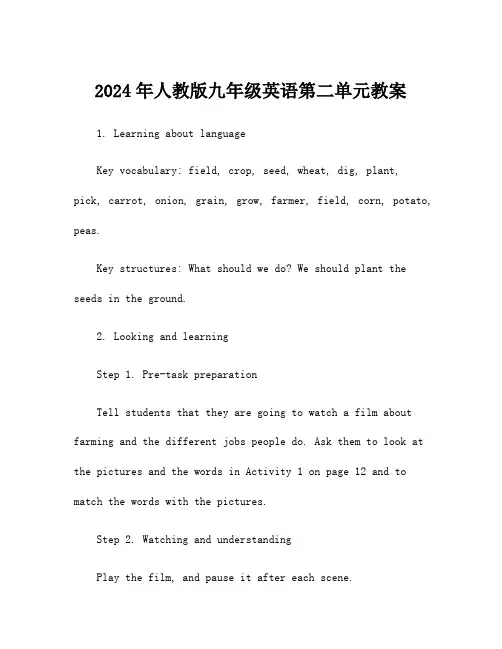
2024年人教版九年级英语第二单元教案1. Learning about languageKey vocabulary: field, crop, seed, wheat, dig, plant, pick, carrot, onion, grain, grow, farmer, field, corn, potato, peas.Key structures: What should we do? We should plant the seeds in the ground.2. Looking and learningStep 1. Pre-task preparationTell students that they are going to watch a film about farming and the different jobs people do. Ask them to look at the pictures and the words in Activity 1 on page 12 and to match the words with the pictures.Step 2. Watching and understandingPlay the film, and pause it after each scene.At the end of the film, ask some questions about the content to consolidate the new words and sentences in Activity 1.Step 3. Working with othersDivide the class into pairs. Ask them to interview each other about the different jobs they can see in the film, using the words and phrases in Activity 1. They should use the questions in Activity 2 on page 12 to help them.Encourage the pairs to use the target language. Monitor and help where necessary.Step 4. Checking and practicingAsk some of the pairs to report back to the class on the different jobs they have talked about.3. Listening and speakingStep 1. Pre-task preparationTell students that they are going to listen to someone talking about the different jobs on a farm.Step 2. Listening and understandingPlay the recording through once for students to listen and understand.Play the recording again, pausing after each section to check students' understanding.Step 3. Working with othersDivide the class into A and B pairs. Ask the A students to look at the pictures in Activity 2 on page 12 and describe them to the B students, using the information in the recording and the words in the box. Encourage students to use the words for different farming jobs.Repeat with the B students describing the pictures to theA students.4. TalkingStep 1. Pre-task preparationTell students that they are going to interview a classmate about the jobs they like or dislike.Step 2. 7alking and understandingDemonstrate the task with one of the students.Start with a volunteer and ask them to sit at the front of the class. Ask the class to help you to find out the jobs that the volunteer likes or dislikes. Use the information in the Let's talk questions and answers. Write the answers on the board and model the language with the class.Step 3. Working in pairsDivide the class into A and B pairs. Ask the A students to look at the pictures and words in Let's talk on page 12 and ask the B students which jobs they like or dislike, using the questions and answers.Repeat with the B students asking the A students which jobs they like or dislike.Encourage students to use polite language and show interest in what their partner has to say. Monitor and help where necessary.5. SummaryAsk some students to report back to the class on the different things they have learned and found out about farming today.。
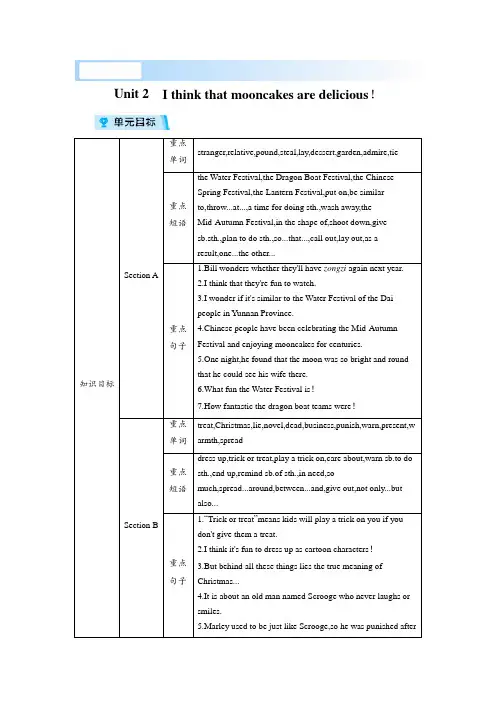
Unit 2I think that mooncakes are delicious!知识目标Section A重点单词stranger,relative,pound,steal,lay,dessert,garden,admire,tie重点短语the Water Festival,the Dragon Boat Festival,the ChineseSpring Festival,the Lantern Festival,put on,be similarto,throw...at...,a time for doing sth.,wash away,theMid-Autumn Festival,in the shape of,shoot down,givesb.sth.,plan to do sth.,so...that...,call out,lay out,as aresult,one...the other...重点句子1.Bill wonders whether they'll have zongzi again next year.2.I think that they're fun to watch.3.I wonder if it's similar to the Water Festival of the Daipeople in Yunnan Province.4.Chinese people have been celebrating the Mid-AutumnFestival and enjoying mooncakes for centuries.5.One night,he found that the moon was so bright and roundthat he could see his wife there.6.What fun the Water Festival is!7.How fantastic the dragon boat teams were!Section B重点单词treat,Christmas,lie,novel,dead,business,punish,warn,present,warmth,spread重点短语dress up,trick or treat,play a trick on,care about,warn sb.to dosth.,end up,remind sb.of sth.,in need,somuch,spread...around,between...and,give out,not only...butalso...重点句子1.“Trick or treat”means kids will play a trick on you if youdon't give them a treat.2.I think it's fun to dress up as cartoon characters!3.But behind all these things lies the true meaning ofChristmas...4.It is about an old man named Scrooge who never laughs orsmiles.5.Marley used to be just like Scrooge,so he was punished after。
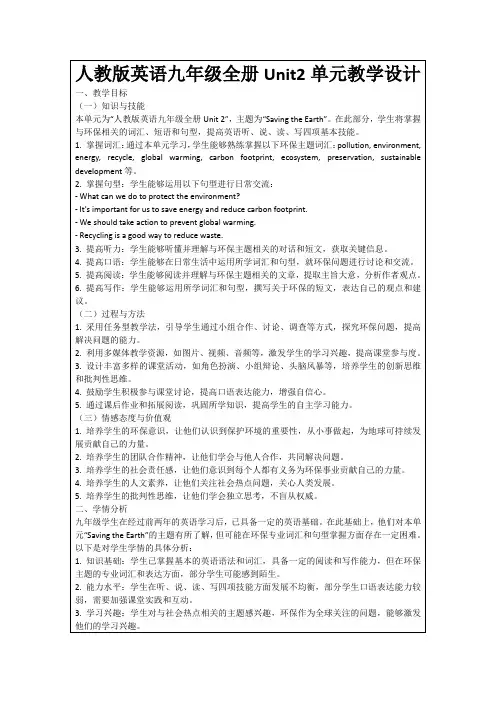
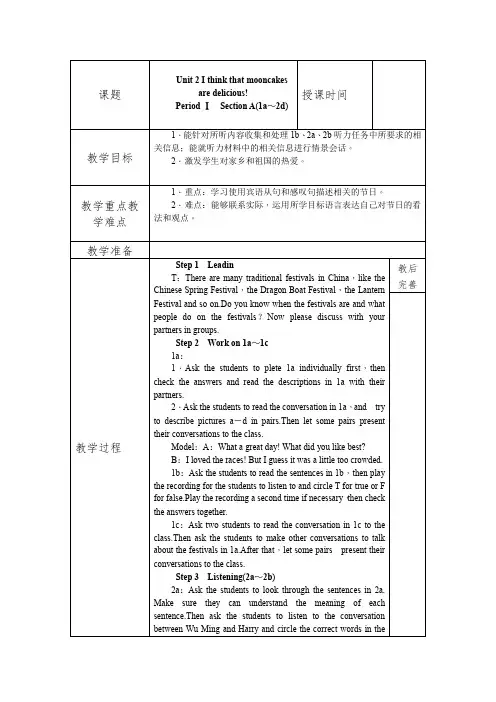
Step 3Grammar Focus1.Ask the students to read the sentences in the grammar box.2.Show the questions and answers in the left column on PPT and circle the words “that” “if” “whether” in each sentence.Then explain the usage of objective clause to students.3.Show the questions and answers in the right column on PPT and circle the words “what” “how” in each sentence.Then explain the usage of exclamatory statements to students.4.Then ask the students to practice the sentences in the grammar box.Step 4Work on 4a,4b & 4c4a:(1)Make sentences and write them in the books.And correct them with the partners.(2)The whole class read aloud the sentences.Help with the pronunciation and intonation.4b:(1)Read the instructions and know what to do.Then read the letter quietly and underline the objective clauses.(2)Check the answers and read out the sentences with objective clauses.(3)Ask students to write their own sentences about Mother's Day and Father's Day.The teacher shows:I know…;I think…;I believe…;I wonder…4c (The students may finish it after class.):(1)The teacher shows the chart:Name Favorite festival Reasons(2)Interview their partners.(3)Write a report to tell the class.Step 5Homework1.Remember the words and phrases in this lesson.2.Interview more students about their favorite festivals after class.3.Write a report about the results of the interview.Spring Festival,the Mid-Autumn Festival,the Lantern Festival,the Dragon Boat Festival) and foreign festivals (Thanksgiving Day,April Fool's Day,Christmas,Halloween) to play a guessing game.Then ask some students to tell the dates of the four foreign festivals.Step 2Presentation(1a)1.Ask students to look at pictures and words related to Halloween in 1a.2.Learn some words and expressions:spider,dress up as,haunted,ghost,trick,treat.3.Ask some students “What do you think this festival is about?”Step 3Listening(1b~1c)1b:Listening skill:pay attention to the key words(1)Play the tape for the first time.Ask the students to master the whole conversation.Then answer the questions in 1b.(2)Discuss the questions and check the answers.1c:(1)Scan these sentences with blanks.(2)Play the recording again.Remind them of the details.Students fill in the blanks.(3)Play the recording for the third time and check the answers.Read aloud the sentences.Step 4Pair work(1d)Think about the Halloween activities that interest you most.Discuss what you have learned with a partner.(Ask students to discuss the Halloween activities with partners and make a conversation.)Step 5Group work1.Discuss in groups and create a mind map about Halloween.2.Make a report like this:Halloween is a popular festival in North America…Step 6Homework1.Remember the words and phrases in this lesson.2.Write a passage about a festival you like,including information about where,when,what to do and what you like best about it.the Ghost of Christmas Past?He sees his happier days as a child.the Ghost of Christmas Present?He sees how others are spending Christmas.the Ghost of Christmas Yet to e?He sees that he is dead,but nobody cares.4.Then ask students to read the passage more carefully again,and focus on the details.Try to find out the answers to the questions in 2d.(1)Why does Scrooge hate Christmas?(2)Does Scrooge have a lot of friends? Why or why not?(3)Why was Jacob Marley punished after he died?(4)Does Jacob Marley want to help Scrooge? How do you know?(5)How does Scrooge feel when he wakes up on Christmas Day?(6)What does Scrooge do after seeing the three spirits?After reading1.Ask the students to read the passage again and find some key words and sentences.In pairs or in groups they discuss firstly.After that,the teacher should emphasize something important and difficult.2.Ask the students a question:What do you think the three ghosts say to Scrooge when they visit him?In groups of four,the students make a conversation between the three ghosts and Scrooge.Then act out the conversation.Step 4Review and retell the story.1.Read the text again and then finish the following mind map.(1)Charles__Dickens(2)Scrooge(3)Jacob__Marley (4)change__his__ways (5)Three2.Retell the story using his/her own words according to the mind map.Step 5Homework1.Remember the words and phrases in this lesson.2.Finish the reading part in your workbook.Unit 2I think that mooncakes are delicious!。

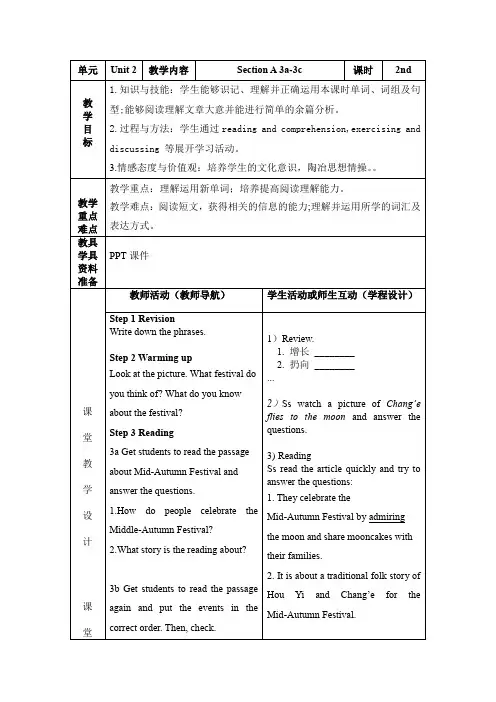
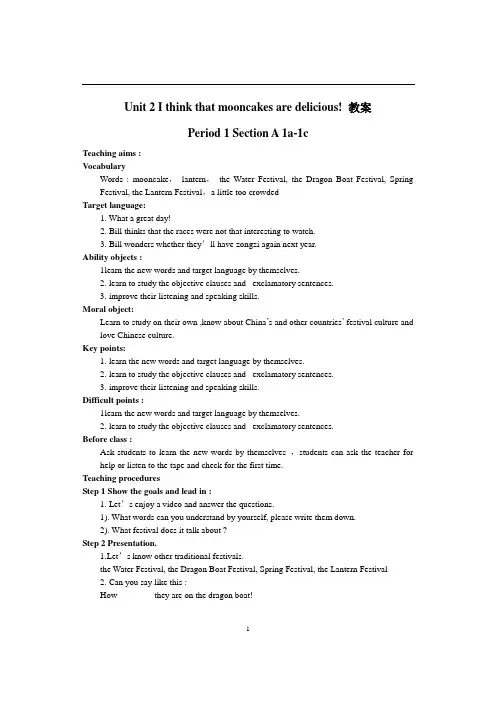
Unit 2 I think that mooncakes are delicious! 教案Period 1 Section A 1a-1cTeaching aims :VocabularyWords : mooncake,lantern,the Water Festival, the Dragon Boat Festival, Spring Festival, the Lantern Festival,a little too crowdedTarget language:1. What a great day!2. Bill thinks that the races were not that interesting to watch.3. Bill wonders whether they’ll have zongzi again next year.Ability objects :1learn the new words and target language by themselves.2. learn to study the objective clauses and exclamatory sentences.3. improve their listening and speaking skills.Moral object:Learn to study on their own ,know about China’s and other countries’ festival culture and love Chinese culture.Key points:1. learn the new words and target language by themselves.2. learn to study the objective clauses and exclamatory sentences.3. improve their listening and speaking skills.Difficult points :1learn the new words and target language by themselves.2. learn to study the objective clauses and exclamatory sentences.Before class :Ask students to learn the new words by themselves ,students can ask the teacher for help or listen to the tape and check for the first time.Teaching proceduresStep 1 Show the goals and lead in :1. Let’s enjoy a video and answer the questions.1). What words can you understand by yourself, please write them down.2). What festival does it talk about ?Step 2 Presentation.1.Let’s know other traditional festivals.the Water Festival, the Dragon Boat Festival, Spring Festival, the Lantern Festival2. Can you say like this :How________ they are on the dragon boat!1What a great day the Water Festival is!3. What do you think of these festivals ?Please say like this:I think that Spring Festival is_____I believe that Spring Festival is_____Step 3 Listening1.Mary and Bill just had a great day on Dragon Boat Festival. They are talking aboutwhat they like best about this festival. Listen to their conversation and circle T or F.2. Check the answers.3. Follow the tape.Step 4 Pair work.1.1c Talk about the pictures in 1a. Or make your own conversations.Examples 1A: What do you like best about the Dragon Boat Festival?B: I love the races. I think they’re fun to watch.Examples 2A Hi,…Of all the traditional festivals, which is your favorite festival?B Well, I like the Chinese Spring Festival best?A What do you like best about …?B I love the feeling that all the family member get together …Step 5 read and think.Read the sentences and find the tules.1.What a great day!2.How fantastic the dragon boat teams were!3. How pretty they were!I guess it was a little too crowded.I wonder if they’ll have the races again next y ear.I believe that I’ll be back again next year to watch the races!Step 6 Summarize.Think about what you learned from this class.Step 7 Homework.2Period 2 Section A 2a-2dTeaching aims :VocabularyWords : stranger, relative, put on, poundTarget language:I believe that we ate at least five meals a day!How delicious the food is!I’ve put on five pounds.I wonder whether June is a good time.Ability objects :1learn the new words and target language by themselves.2. learn to study the objective clauses and exclamatory sentences.3. improve their listening and speaking skills.Moral object:Learn to study on their own ,know about China’s and other countries’ festival culture and love Chinese culture.Key points:1learn the new words and target language by themselves.2. learn to study the objective clauses and exclamatory sentences.3. improve their listening and speaking skills.Difficult points :1learn the new words and target language by themselves.2. learn to study the objective clauses and exclamatory sentences.Before class :Ask students to learn the new words by themselves ,students can ask the teacher for help or listen to the tape and check for the first time.Teaching proceduresStep 1 Lead in .3Watch the video and answer:what festival is it ? What do you think of it ?Please say like this :How ___________________!What ________________!I think/ guess/ believe_____________.Step 2 work on 2d.1. Before reading , can you ask questions about the Water Festival in Thailand ?Where / when / what/why…2. While readingRead 2d, and fill in the blanks.3. Role-play the conversationStep 3 Work on 2a &2b.2aWu Ming went somewhere for his holiday.Where did he go? Who did he visit? What did he enjoy best? Read and predict.1 Wu Ming and Harry are cousins/strangers/friends.2 Wu Ming went to Singapore/ Hong Kong/ Macao for his vacation.3 He visited his relatives/friends/classmates.4 He enjoyed eating out/ shopping/ the Dragon Boat Festival best.2bWu Ming did a lot of fun activities, but there were also downslides. Listen again and fill in the chart.Please take notes and use abbreviation.Fun Activities DownslidesEating out putting on five poundsShopping spending so much moneyDragon Boat Festival in June quite hotStep 4 work on 2cRole –play conversations between Wu Ming and Harry. Use the information in 2a and 2b or make your own conversations.A Hi,…Where did you go on your vacation?B I went to…A What did you do there?B I visited…I think that I ate five meals a day and I’ve put on five pounds.A I guess the food was delicious, right? What else did you do?B…A What was the best part of this trip?B I think…4Step 5WritingPlease introduce a Chinese festival you experienced to friends in Thailand.Dear friend in Thailand,I like _______ best. on __________Festival, I/we___________________________. Ithink __________________________....Yours in ChinaStep 6 Summary and homework.第3课时Section B 1a-2e教学目标一、知识与技能1. 掌握本节课重点短语和词汇。
Unit 2 I used to be afraid of the dark[语言目标]language goal:Talk about what you used to be like.谈论你过去的外表。
[学习目标]Functions:1. 学会陈述自己过去常做的事情2. 学会陈述自己过去的爱好等3. 能够表达自己现在和过去在外表、性格、娱乐等方面的变化4. 能够表达朋友、家人等现在和过去的变化[语言结构]Target Language:1. I used to be short when I was young. 我年轻时个子很矮。
2. —Did you use to have straight hair? 你过去是直发吗?—Y es, I did. 是的。
3. —Did you use to play the piano? 你过去弹钢琴吗?—No, I didn’t. 不,我不弹。
4. I used to be afraid of dark..我过去害怕黑暗。
5. I’m terrified of the snakes. 我害怕蛇。
6. —Did you use to be afraid of being alone? 你过去害怕独自一人呆着吗?—Y es, I did. 是的,我怕。
7. I used to walk to school. 我过去走着上学。
[主要词汇]V ocabulary:dark 黑暗sure 无疑,确实terrify 使害怕,使恐惧on 接通的,工作着的spider 蜘蛛insect 昆虫chew 嚼,咀嚼gum 口香糖right 立即,马上comic 连环漫画hardly 不十分,简直没有used to do sth. 过去经常be interested in 对…感兴趣be on the swim team 是游泳队成员be afraid of 害怕be terrified of 害怕with the light on 灯开着做…worry about 担心chew gum 嚼口香糖these days 目前,如今not…anymore 不再[词汇复习]recycling:short hair 短发curly hair 卷发long hair 长发straight hair 直发tall 高的short 矮的(be)medium height 中等身高thin 瘦的heavy 重的,沉的(have/has) a medium build 中等胖瘦[语法分析]一、本单元语法重点内容是used to这个句型。
九年级unit2 I think that mooncakes are delicious!SectionB 2b The spirit of Christmas学习目标1. 能谈论中国和国外的常见节日的日期、传统食物、标志和故事等。
2. 能掌握“inferring”推测的阅读技巧并猜测课内和课外的词义。
3 能掌握文章中的一些常见词组和优美句子,并能运用到自己的作文中。
教学过程:Step 1 Pre-readingFree talk.T show some pictures of festivals in China and in foreign countries.T: What are the common things that you think of for Christmas Day?Ss: …T: On Christmas Day, we will receive a lot of gifts or Christmas cards, we’ll see Christmas trees in every families…(导入,引出圣诞节的文化背景以及与本文有关的单词)(自下而上模式:教师在导入的句子里让学生感知、输入新单词和词组)Step 2 While-readinga. Read quickly and find out the main idea of the passage.(Reading skill: Look at the picture and read the title or the first senence)b. Read again and answer the questions.Q1.What are the common things that people think of for Christmas?Q2.Who wrote A Christmas Carol?Q3.What is the true meaning or spirit of Christmas?c. Reading strategy: Inferring.“mean”1.What does “Christmas” mean? It means “圣诞节”.2.She has lots of money, but she doesn’t buy anything and she doesn’t want to givemoney to others. She is very mean.3.Scrooge means who is very mean“sprit”1.…the true meaning or spirit of Christmas.2.the power of human spirit to overcome difficulties.3.the spirit of Christmas.4.expect three spirits to visit him … the Ghost of…“lie”1.Xiao Qiang is ill, so he is lying (原形lie)in bed.2.snow lie thick on the ground3.The town lies on the coast(海岸).4.What reason lie behind the strange events?5.behind all these things lies the true meaning…“present”1.Three spirits :a. the Ghost of Christmas pastb. the Ghost of Christmas presentc. the Ghost of Christmas yet to come2. Today is my birthday, my mother gives me a teddy bear as my birthday present.(自上而下模式:学生略读找出主旨大意,细读找出文章细节内容,再根据“推测”的阅读技巧猜测本文中新单词的意思并拓展该单词其它的意思。
九年级秋季同步第二讲Have a try! 用所给词的正确形式填空。
1. The girl used (be) shy. But she (change) a lot in the past few years and she is pretty outgoing.2. His father has been for nearly one month. He has to continue his school by doing a part-time job after his father ’s (die).3. Children are the of the parents. Parents are always of them.(pride)4. Finally, he made a (decide) not (waste) time surfing on internet.5. Nothing can him. He isn ’t of touching snakes.(terrify)看点一. “兴趣”是最好的老师归纳:be interested in:interesting: interest:He takes an interest in swimming.Tom lost interest in swimming when he was young. I have no interest in playing the piano.1. Uncle Huang is a very ____________ person. He always tells ___________ stories. (interest)2. Why are you so ____________ in learning the piano?(interest)3. His father took a great interest in learning English.= His father _________ very ________ ________ learning English.看点二. worry归纳:be worried about worry: v.1. His father is ill; he __________ (担心) about his father.2. She looks a little __________(焦虑)。
3. 不要担心我,我能够照顾好自己。
_______________________________________________________.看点三. spend: 人做主语 cost: 物做主语 take: It 做主语 pay: 人做主语,pay for; 归纳:1. I 50 yuan to buy that T-shirt.2. He yuan for that T-shirt.3. It me 50 yuan to buy that T-shirt.4. That T-shirt me 50 yuan.看点四. hardly归纳:hardly ever1. 我们几乎没有时间吃早饭。
We _______________________________________________. 2. ---I didn ’ t know you take a bus to school.---Oh, I _________ take a bus, but it is snowing today.A. hardlyB. neverC. sometimesD. usually 3. 我几乎从来不去动物园,我不喜欢动物。
__________________________________________________________.升级版考点:There is hardly a cloud in the sky, __________ ___________? (反意疑问句)看点五. in the end: 最终=at last、finally at the end of: 在……的尽头;by the end of: 到……为止;1. He is down the garden. 他在花园的尽头的那边。
2. we found the house. 最后,我们找到了这座房屋。
3. the last term, we had learned 2,000 English words. 到上学期末,我们已经学习了2,000 个单词。
归纳:看点六. give up: 放弃;give in: 投降、认输;give off: 释放、发散(光、热);1. She has to some of her hobbies because she has no time to spend on them.A. give upB. give inC. give off2. Don’t , you still have chance.A. give offB. give upC. give in3. The sun heat and light.A. give offB. give upC. give in归纳:看点七. few little 否定a few a little 肯定可数n. 不可数n.1. 我无语:I have words.2. 我有话说:I have words.3. 我有些钱:I have money.4. 我几乎没钱:I have money.归纳:看点八:seem归纳:it seems that……it seems that it will rain.sb seem to do sth…Mr Green doesn’ t seem to like the idea.1. The maths problems seems __________ to work out.A. be difficultB. is difficultC. to difficultD. to be difficult2. It seems that he doesn’ t have many friends.He __________ seem ________________________________.看点九:patientbe patient with sbbe patient of sth: 忍耐某事The nurse is pretty patient with patients in hospital.看点十:sendsend sb sth= send sth to sbsend sb to….send for sb: 派人去叫、请某人1. 我寄给我妈妈一件礼物。
I __________________________________________.2. 老板派遣我去北京。
The boss ____________________________________.3. Have you sent ___________ a doctor?A. awayB. upC. offD. for4. I decided to send him __________ this problem.A. to dealB. to deal withC. dealD. deal with看点十一:trytry to do sthtry doing sth1. Why ___________ it in some other ways?A. not try to doB. don’ t try doing\C. not try doingD. don’ t try to do2. The doctors have tried __________ the sick boy.A. his best to saveB. their best savingC. his best savingD. their best to save3. How nice the jacket is! Can I __________ it __________?A. try ; outB. try; inC. try; onD. try; again看点十二:diedie:__________; death:___________; dead:___________; dying:_____________;1. His father died 3 years ago.His father has ___________ ____________ ____________ for 3 years.2. The ___________ old man told his sons all about his money they wanted.A. diedB. deathC. deadD. dying【动动脑筋】What can’t be used unless broken? 什么东西不碎就不能用?---------------------------------------------------我是华丽丽的分割线-------------------------------------------------------★used to do sth:过去常常做某事。
否定didn’t use to do sth★be used to doing sth:习惯做……★be used to do/ be used for doing 是一个典型的被动语态的表达, ……被用来做……基础句型转换:1. His sister used to be really quiet.(改为一般疑问句,并否定回答)---___________ his sister __________ __________ ___________ really quiet?---__________________________.2. I used to stay at home on Sunday evening.(改为否定句)I ________ _________ ___________ stay at home on Sunday evening.3. 我习惯于早起床。
I _________________________________________________.4. 邮票用来寄信。